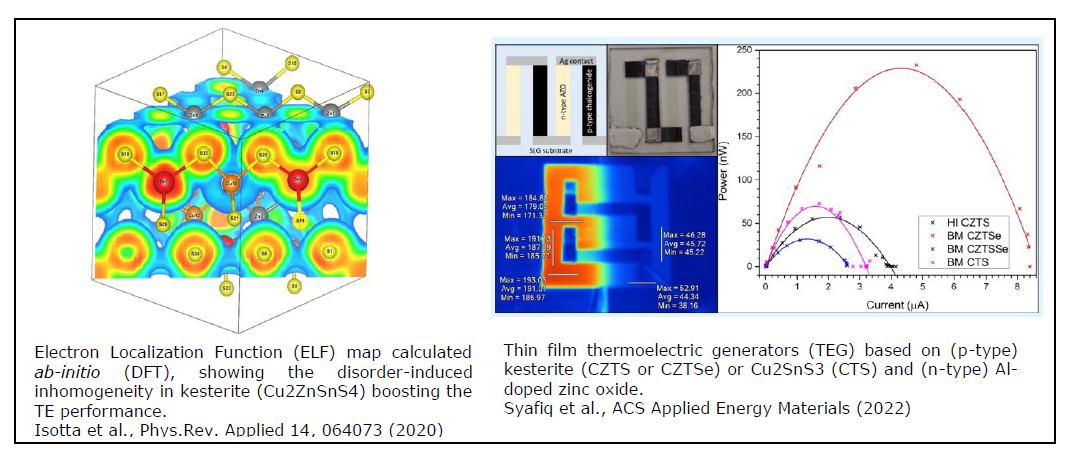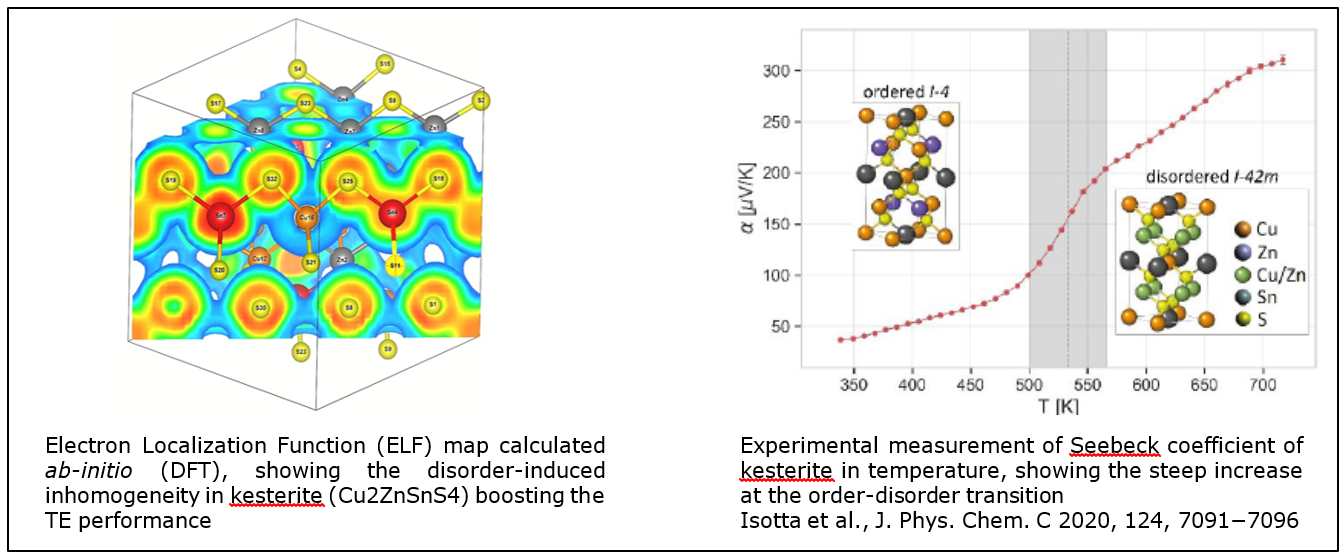OPEN POSITIONS
for more information contact paolo.scardi@unitn.it
June, 2024 Open positions for PhD students
New PhD position with the title of “Integrated PV-AEM Electrolyzer System for Efficient Green Hydrogen Production” at the DICAM.
This position is part of Curriculum C - Modelling and Simulation, which involves working within a group that also deals with experimental activities. Candidates may either be directly involved in these experimental activities or contribute to modelling and simulation using experimental data inputs.
Candidate Requirements:
- Strong background in materials science, solid state physics and, chemistry of materials
- Proficiency in simulation techniques
- Solid understanding of theoretical concepts related to the field
Desirable: Candidates with preliminary experience in Atomistic simulation e.g., Density Functional Theory (VASP/Quantum Espresso) and/or Molecular Dynamics (LAMMPS) and Machine Learning will be preferred.
Position Details: For more information about the position, please visit the following link:
https://www.unitn.it/ateneo/111487/concorso-di-ammissione-secondo-bando
Application deadline: August 20, 2024 at 4:00 p.m. (Italian time)
Candidates interested in this exciting opportunity should send their CV detailing their relevant
experience and research interests to Dr. Narges Ataollahi at narges.ataollahi@unitn.it
We look forward to receiving your application and potentially welcoming you to our team.
- November, 2024
The PhD call for the topic Integrated PV-AEM Electrolyzer System for Efficient Green Hydrogen Production has closed, and the selected candidate is Sirisha Subbareddy.
July 7, 2022 Open positions for PhD students starting from November 2022 (cycle 38)
Curriculum B - Mechanics, Materials, Chemistry and Energy
Title: Advanced Thermoelectric materials and generators
P.I.: Prof. Paolo Scardi, Prof. Dr. Narges Ataollahi
While thermoelectric generators (TEGs) have been known for decades for the recovery of waste heat and the general possibility of transforming thermal gradients into electricity, real applications require performances that are still far from what is allowed by traditional materials.
"Engineering" the structural disorder in semiconductor materials seems a promising solution that we have begun to explore: (i) experimentally, with the production of materials by high-energy reactive milling; (ii) by developing all necessary measurement and characterization techniques, and (iii) by means of the most advanced ab initio modeling techniques based on density functional theory (DFT) using high performance computing (HPC) facilities. The last challenge is (iv) to transfer all concept to working devices, especially thin film TEGs.
The thesis work involves a systematic exploration of the disorder introduced into chalcogenides (sulfides or selenides, in particular with 2,3 or more cations), to develop new, highly performing and sustainable thermoelectric materials. The last is a strong point in the project, as we wish to consider materials and devices based on non-toxic, widely available and not expensive materials. The thesis project is open to being experimental with a part theoretical/modeling-based, with a necessity to understand both aspects. Part of the Thesis work can be carried out at the Max-Planck-Institut für Festkörperforschung of Stuttgart (D), in the group of Prof. R. Dinnebier; and other European large scale facilities. Ideal candidates should be motivated towards an international research thesis, and have a background in Physics, Chemistry (or Materials, Energy, Industrial Engineering). Specific experience on thermoelectricity is highly considered.

Start of the Academic Year: November 1st, 2022
Duration of the Programme: 3 years
Deadline for application: August 31, 2022, hrs. 04.00 PM (Italian time, GMT +2).
For more details information about the call, please visit:
https://www.unitn.it/en/nop-call
November, 2022
Marcelo Malagutti has won the Advanced Thermoelectric materials and generators Scholarship. He`s got an Open position for PhD students starting from November 2022.
October 27, 2021 Open positions for PhD students starting from January 2022 (cycle 37)
National operational programme (NOP) on research and innovation 2014-2020: Doctoral Programmes on Green topics
Title: Development of Novel Membranes Fuel Cells: a Green Technology for Power Generation
P.I.: Prof. Paolo Scardi, Prof. Rosa Di Maggio, Dr. Narges Ataollahi
Energy and environment are fundamental themes of modern society, and one of the main directives of scientific research for the coming years. The two themes are often intertwined, as in this project, which proposes the recycling of one of the most common plastics, PET, for the production at low costs of Proton Exchange Membranes (PEMs) for newly conceived and highly performing fuel cells. The aim of the project is to ultimately develop an innovative solution to meet the energy and technology need, which reduces depletion of non-renewable resources while being economically effective.
Start of the Academic Year: January 1st, 2022
Duration of the Programme: 3 years
Study and research in a company (Arco FC): 6 months
Deadline for application: October 27, 2021, hrs. 04.00 PM (Italian time, GMT +2).
For more details information about the call, please visit:
https://www.unitn.it/en/nop-call
June 17, 2021 Open positions for PhD students starting from November (cycle 37)
Title: Advanced anion exchange membranes for Fuel Cells with improved conductivity and mechanical stability
P.I.: Prof. Paolo Scardi, Prof. Luca Deseri, Dr. Narges Ataollahi
Curriculum: Mechanics, Materials, Chemistry and Energy
Fuel cells (FCs) are essential for the phase-out of fossil fuels, primarily in transportation systems. They are in fact the leading devices for exploiting hydrogen in energy production, with high efficiency and no polluting emissions. However, there are still some open challenges to making fuel cells commercially viable. Alkaline anion exchange membrane fuel cells (AAEMFCs) employ solid polymeric electrolytes, which conduct hydroxide ions, with the advantage over other FCs of functioning with low (ultimately eliminated) loadings of precious metal electrocatalysts, reducing cost. To this end, a careful design of the membrane is required, to give it both high ion conductivity and thermo-mechanical stability. In this project, an experimental and theoretical modelling investigation into the enhancement of anion exchange membrane FCs will be undertaken; this will involve the synthesis of oxide materials and functionalized polymeric membranes, along with micro- and multi-scale mechanical simulations, using the finite element method as well as density functional theory and classical molecular dynamics. Hence, assessing the efficiency of functionalized oxides and positive influence on membrane durability is a main target of the work, potentially leading to longer life-times for polymer electrolyte membrane FCs. The project involves building FC prototypes to power small electronic devices.
For more details information on the Doctoral School, see also:
https://www.unitn.it/ateneo/663/concorso-di-ammissione
September 2021: Eleonora Tomasino has won the PhD Scholarship.
September 2020: Disordered Materials for Thermoelectric Devices Scholarship. Open position for PhD students starting from November 2020.
May 2020. Open positions for PhD students starting from November (cycle 36)
Title: Disordered Materials for Advanced Thermoelectric Devices
P.I.: Paolo Scardi
Curriculum: Mechanics, Materials, Chemistry and Energy
Synthetic description of the project and research outcomes:
While thermoelectric (TE) generators have been known for decades for the recovery of waste heat and the general possibility of transforming thermal gradients into electricity, real applications require performances that are still far from what is allowed by traditional materials. "Engineering" the structural disorder in semiconductor materials seems a promising solution that we have begun to explore: (i) experimentally, with the production of materials by high-energy reactive milling; (ii) by developing all necessary measurement and characterization techniques, and (iii) by means of the most advanced ab inito modeling techniques based on density functional theory (DFT) using high performance computing (HPC) facilities.
The thesis work involves a systematic exploration of the disorder introduced into chalcogenides (sulfides or selenides, in particular with 2,3 or more cations), to develop new, highly performing TE materials, starting from the current paradigm of Phonon Glass Electron Crystal (PGEC) materials and potentially culminating in the most challenging and promising topological insulators. The thesis project is open to being experimental and/or theoretical/modeling-based, with a necessity to understand both aspects, in order to cover the full breadth of topics and make available all the necessary tools for a research group dedicated to the themes of TE materials. Ultimately, this can also be decided on the basis of the candidate's best attitudes and propensities.
Part if the Thesis work can be carried out at the Max-Planck-Institut für Festkörperforschung of Stuttgart (D), in the group of Prof. R. Dinnebier; and other European large scale facilities.

Ideal candidates should be motivated towards an international research thesis, and have a background in Physics, Chemistry, or (Materials, Energy, Industrial) Engineering.
For more details on the Doctoral School, see also: https://www.unitn.it/dricam/




